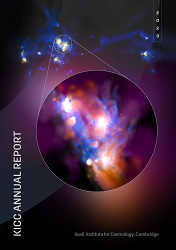DES
The Dark Energy Survey (DES) is an international collaboration between more than 400 scientists at 24 research institutes located in eight different countries. The DES team has built and operated a highly sensitive 570-Megapixel digital camera, DECam, installed at the Blanco 4-meter telescope in the Chilean Andes, to map 5000 square degrees of the sky, collecting data about the position, colour and shape of more than 300 million galaxies.

With this data, DES scientists – including KICC researchers at the forefront – are studying how the large-scale density fluctuations that are present in our Universe evolved over time. Gravitational collapse should increase the amplitude of these fluctuations, but the mysterious dark energy, which aparently makes up about 70% of the Universe's energy budget, is accelerating the cosmic expansion and hence slowing down the collapse of structures. Among other goals, the DES team wants to study carefully this balance of expansion of the Universe and collapse of the Universe's structures to learn more about the nature of dark energy.
DES began surveying the Southern skies in August 2013 – an effort that only recently concluded in January 2019. The dataset collected in this six-year mission is so rich that DES scientists are still very much in the middle of analysing it. After publishing a first round of investigations of year-1 data in 2017, the team has recently released another set of scientific results derived from year-3 data in 2021. KICC researchers have taken on key roles in these analyses and have also led several of the resulting publications. For further reading, see, e.g., the following links.
- official DES website (including public outreach material):
https://www.darkenergysurvey.org
- DES publications lead by KICC scientists:
correlation of early DES data with CMB lensing
year-1 kinematic SZ-effect (in combination with SPT data)
year-1 Density Split Statistics
year-3 Covariance & Likelihood Modelling
year-3 Cosmic Shear Analysis
Members of KICC involved in the Dark Energy Survey include:
- Dr Alexandra Amon (Weak lensing coordinator)
- Professor George Efstathiou
- Dr Oliver Friedrich
- Professor Richard G McMahon
- Leah Bigwood
- Calvin Preston


